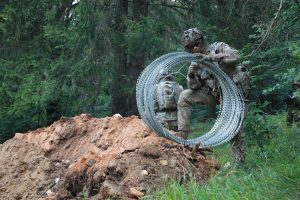The Power of the Palchinsky Principles: How Failure Can Lead to Success

Failure is an uncomfortable but inevitable part of life, yet it also presents an opportunity for growth and learning. To learn from failure, it is important to approach the situation with a strategic and systematic mindset. One approach that I discovered after reading Tim Harford’s Adapt is known as the Palchinsky Principles. The Palchinsky Principles is a decision-making framework developed by an early 20th-century Russian engineer Peter Palchinsky, and while these principles were initially developed for engineers and policymakers, they can also be applied to military leadership.
Principle 1: Variation: Seek out new ideas and try new things.
The first principle of the Palchinsky Principles is to seek out new ideas and try new things. When we experience failure, it may feel natural to be defensive or closed off to feedback. Yet, to learn from our failures and enable us to attain success down the road, it is imperative to seek feedback from others from their perspective and apply new solutions. By doing so, we can have a better understanding of what did not work and what we can do to improve.
Principle 2: Survivability: Try new things at a scale where failure is ‘survivable.’
The next principle encourages decision-makers to take calculated risks with experimentation, but in ways that minimize the potential negative consequences of failure. Military leaders often face dynamic and complex situations, where taking risks is necessary to obtain strategic objectives. However, without proper consideration of the second and third-order effects can negatively impact time, resources, and even loss of life. Therefore, calculating risks and adjusting can increase your chance of success.
Principle 3: Selection: Seek feedback and learn from your mistakes.
The last principle is to be flexible and adaptable. To succeed after experiencing failure, it is important to not become attached to an approach that isn’t getting results or wanting a particular outcome. Rigid thinking in a military leader inhibits one’s ability to see the bigger picture, where new threats and challenges can emerge at any time. One key tool that the military utilizes is conducting After-action reviews (AARs). By conducting AARs, teams can openly and honestly communicate shortcomings and sustains from their perspective. When done effectively, individuals, teams, and organizations can learn from mistakes and improve performance in the future.
The Palchinsky Principles demonstrate a valuable framework for military leaders to be comfortable with failure and face complex, even uncertain, situations head-on. Here are some reasons why the Palchinsky principles are important:
- Embrace experimentation and iteration. Military leaders need to practice adaptability, flexibility, and experimentation to apply a commander’s strategy with the technologies available to them. However, as the old maxim goes, the ‘enemy always gets a vote.’ Leaders must be willing to try new approaches and continuously refine them as a way to adapt to the evolving situation on the ground.
- Encourage diversity of thought. Leaders should seek and will benefit from different perspectives and ideas from their team. This challenges leaders to cultivate an inclusive culture that values the diverse background and experiences of each team member. Considering the varying viewpoints, leaders can make informed decisions and avoid blind spots.
- Focus on systemic thinking. Finally, the Palchinsky approach emphasizes the importance of systemic thinking. Leaders should consider the broader context in which their organization operates and understand the different elements of their mission. Through this approach, leaders can identify and address the root causes of organizational issues, rather than just treating the symptoms.
In conclusion, the Palchinsky principles provide a useful framework for military leaders to navigate to solve problems within their organization. It is through facing failures that we learn to grow. Having the willingness to learn can turn failure into an opportunity for success.
CPT Jakob Hutter is a Kansas Army National Guard logistics officer currently serving as a Plans Officer for the 169th Combat Sustainment Support Battalion in Leavenworth, Kansas. In addition, he also serves as the Kansas FLIPL Program Manager. He has a Master of Science in Organizational Leadership and received his commission from Kansas State University in 2016. He is passionate about the science of Army logistics, the art of military leadership, and combining both to provide effective sustainment.
Related Posts

Fighting as an Enabler Leader
(U.S. Army Photo by Cpl. Tomarius Roberts, courtesy of DVIDS)Enablers provide capabilities to commanders that they either do not have on their own or do not have in sufficient quantity …

Defeating the Drone – From JMRC’s “Skynet Platoon”
If you can be seen, you can be killed—and a $7 drone might be all it takes. JMRC’s Skynet Platoon discuss their TTPs to defeat the drone.

3 Deployments Before Captain: Reflections From Down Range
Deployments challenge junior officers beyond their primary duties, often demanding adaptability, wellness management, proactive leadership, and moral integrity maintenance.
